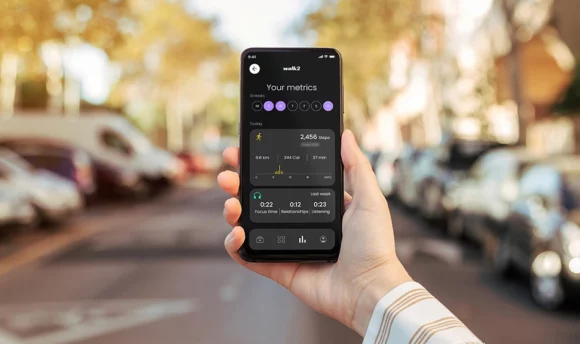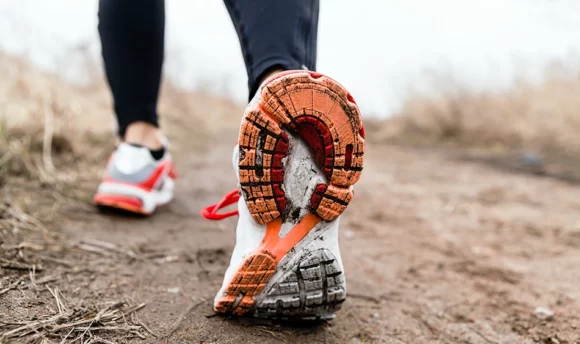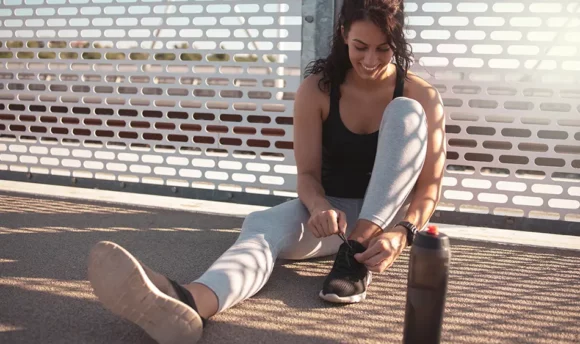What Is the Average Half-Marathon Time?
Completing a half-marathon is thrilling, but have you ever wondered what the average time is?

Half-marathons are an exciting step-up for runners who have completed many 3.1 miles and 6.2 miles races. If you want to improve your running pace, you should know what a good half-marathon time is and how to exceed it.
This guide explains the average half-marathon time, how to achieve a faster pace, and factors that would affect your ability to reach that time.
What Is the Average Half-Marathon Time?
The average half-marathon time is 1:50:15 across all ages and genders. It is the average time a runner would take to finish a half-marathon race.
For novice runners in high school, the average half-marathon times are 2:05:30 for males and 2:31:46 for females. Intermediate runners between the ages of 20 and 30 will take 2:01:07 to 2:00:14. Advanced runners in their late 30s have an average half-marathon time of 1:38:40.
How Long Is a Half-Marathon?
A full marathon is 26.2 miles (42.195 kilometers), making a half-marathon distance 13.1 miles (21.097 kilometers). How long it’ll take you to complete 13.1 miles is up to you.
Other race types include 5 kilometers (5K), 10 kilometers (10K), and ultra marathons (above 26.2 miles). As each category differs, they also require different combinations of strength and endurance.
How Long Does It Take to Run a Half-Marathon?
The time it takes to run a half-marathon is generally dependent on your biological factors and is different for everyone. The current half-marathon world record is held by the Ugandan runner Jacob Kiplimo, with a finish time of 57:31 and a pace of 4:23.2 per mile.
The half-marathon world record for the female category is held by the Ethiopian runner Letensebet Gidey, with a recorded 1:02:52 and a speed of 4:47.7 per mile.
What Is Considered a Good Half-Marathon Time?
A good half-marathon time is anywhere from 2 hours 20 minutes to 3 hours – for a first half-marathon. For women, a good half-marathon time is 2 hours and 12 minutes, while for men, it is 1 hour, 43 minutes, and 33 seconds.
Whether this is equally good for you will depend on your running goal pace and current position. The timing is just an estimate, and you shouldn’t uphold it as your ideal half-marathon finish time.
What Is the Average Half-Marathon Pace?
A half-marathon pace refers to how long it takes a runner to reach a mile or kilometer. Having determined that the average half-marathon time is 1:50:15, the average pace is 8:24 minutes per mile.
The half-marathon time you desire should determine your required average pace. If you’re unsure of what a good half-marathon pace is for you, try out a pace calculator to determine possible pace targets.
What Factors Impact the Half-Marathon Time?
Numerous factors impact a runner’s half-marathon time, including weather, the topography of your course, weight, running gear, air temperature, and many more. However, three main factors influence your ability to reach a good half-marathon time: age, sex, and running ability.
Age groups
Due to biological capabilities that vary with age groups, half-marathon times can either go up or down. Generally, your half-marathon average time and pace will reduce as you exit your teen years, then peek around your 30s.
Intermediate male runners at age 15 finish a half-marathon at 1:47:15. It peaks at 1:43:33 between the ages of 20 and 30 and begins to increase at 35 with 1:44:08. The finish time is considerably slower for females having 2:11:26 at age 15.
The decline in pace begins at age 35. While it’s undoubtedly challenging, staying fit for a half-marathon is not impossible. An excellent tip to follow is starting strength workouts right from your 20s.
You’ll lose muscle mass while growing older, but strength training will help build bone strength and maintain healthy blood pressure. Additionally, you’ll need to get more sleep. Ideally, that’s 7–9 hours of sleep each night. Other tips include:
- Eating a balanced diet
- Maintaining a constant routine with intermittent breaks
- Focusing on lower leg strength as you age
Sex
Between men and women, men generally run faster than their female counterparts. It’s evident in the global half-marathon finish time for both sexes. The difference in ability is because men generally have leaner body mass and a more considerable percentage of fast-twitch muscle fibers.
A study confirms that men are statistically faster than women – men being 12.4% faster. You’ll notice this difference in the half-marathon time data compared between both sexes across running abilities.
An elite female half-marathon runner can finish the run between 1:36:14 and 1:36:25. In contrast, a male half-marathon runner in the same category will finish between 1:21:26 and 1:20:59.
Despite of these statistics, both – men and women – are great runners who can compete equally.
Running ability
Your running ability is mainly dependent on your fitness level, how long you’ve been running consistently, and your percentage on the scale of runners. The five running ability categories are beginner, novice, intermediate, advanced, and elite.
Beginner runners just started running and have run consistently for at least one month. These runners rank above 5% of runners globally. Novice half-marathon runners have run regularly for at least 6 months and are faster than 20% of runners.
An intermediate runner has run regularly for at least 2 years and is faster than 50% of runners. Advanced runners have run for at least 5 years and are quicker than 80% of runners.
Lastly, elite half-marathon runners run competitively after dedicating over 5 years and are quicker than 95% of runners globally. World record-holders in the half-marathon races are under the elite runner’s category.
Male Average Half Marathon Finish Time
| Age | Beginner | Novice | Intermediate | Advanced | Elite | WR |
| 10 | 02:53:28 | 02:25:01 | 02:03:56 | 01:48:22 | 01:36:56 | 01:09:26 |
| 15 | 02:30:06 | 02:05:30 | 01:47:15 | 01:33:47 | 01:23:53 | 01:00:05 |
| 20 | 02:24:57 | 02:01:11 | 01:43:33 | 01:30:33 | 01:20:59 | 58:01 |
| 25 | 02:24:57 | 02:01:11 | 01:43:33 | 01:30:33 | 01:20:59 | 58:01 |
| 30 | 02:24:57 | 02:01:11 | 01:43:33 | 01:30:33 | 01:20:59 | 58:01 |
| 35 | 02:25:45 | 02:01:51 | 01:44:08 | 01:31:03 | 01:21:26 | 58:20 |
| 40 | 02:29:29 | 02:04:59 | 01:46:48 | 01:33:24 | 01:23:32 | 59:50 |
| 45 | 02:35:40 | 02:10:09 | 01:51:13 | 01:37:15 | 01:26:59 | 01:02:19 |
| 50 | 02:42:27 | 02:15:49 | 01:56:04 | 01:41:30 | 01:30:47 | 01:05:01 |
| 55 | 02:49:52 | 02:22:01 | 02:01:21 | 01:46:07 | 01:34:55 | 01:07:59 |
| 60 | 02:57:59 | 02:28:48 | 02:07:09 | 01:51:11 | 01:39:27 | 01:11:14 |
| 65 | 03:06:54 | 02:36:16 | 02:13:32 | 01:56:46 | 01:44:26 | 01:14:49 |
| 70 | 03:16:46 | 02:44:31 | 02:20:35 | 02:02:56 | 01:49:57 | 01:18:46 |
| 75 | 03:30:18 | 02:55:49 | 02:30:15 | 02:11:23 | 01:57:31 | 01:24:11 |
| 80 | 03:52:01 | 03:13:59 | 02:45:46 | 02:24:57 | 02:09:39 | 01:32:52 |
| 85 | 04:26:50 | 03:43:05 | 03:10:38 | 02:46:42 | 02:29:06 | 01:46:48 |
| 90 | 05:26:00 | 04:32:33 | 03:52:55 | 03:23:40 | 03:02:10 | 02:10:29 |
Female Average Half Marathon Finish Time
| Age | Beginner | Novice | Intermediate | Advanced | Elite | WR |
| 10 | 03:24:32 | 02:54:11 | 02:30:51 | 02:13:09 | 01:59:51 | 01:20:58 |
| 15 | 02:58:13 | 02:31:46 | 02:11:26 | 01:56:01 | 01:44:26 | 01:10:33 |
| 20 | 02:44:13 | 02:19:51 | 02:01:07 | 01:46:54 | 01:36:14 | 01:05:01 |
| 25 | 02:42:58 | 02:18:48 | 02:00:12 | 01:46:06 | 01:35:30 | 01:04:31 |
| 30 | 02:43:01 | 02:18:50 | 02:00:14 | 01:46:07 | 01:35:32 | 01:04:32 |
| 35 | 02:44:33 | 02:20:08 | 02:01:22 | 01:47:07 | 01:36:25 | 01:05:08 |
| 40 | 02:48:23 | 02:23:24 | 02:04:11 | 01:49:37 | 01:38:40 | 01:06:39 |
| 45 | 02:54:51 | 02:28:54 | 02:08:57 | 01:53:49 | 01:42:27 | 01:09:13 |
| 50 | 03:04:28 | 02:37:06 | 02:16:03 | 02:00:05 | 01:48:06 | 01:13:01 |
| 55 | 03:16:00 | 02:46:55 | 02:24:33 | 02:07:36 | 01:54:51 | 01:17:35 |
| 60 | 03:29:05 | 02:58:03 | 02:34:12 | 02:16:06 | 02:02:31 | 01:22:46 |
| 65 | 03:44:01 | 03:10:47 | 02:45:13 | 02:25:50 | 02:11:16 | 01:28:41 |
| 70 | 04:01:16 | 03:25:28 | 02:57:56 | 02:37:04 | 02:21:23 | 01:35:30 |
| 75 | 04:21:23 | 03:42:36 | 03:12:47 | 02:50:09 | 02:33:10 | 01:43:28 |
| 80 | 04:48:33 | 04:05:44 | 03:32:49 | 03:07:51 | 02:49:05 | 01:54:14 |
| 85 | 05:35:00 | 04:45:17 | 04:07:04 | 03:38:04 | 03:16:18 | 02:12:37 |
| 90 | 06:59:49 | 05:57:32 | 05:09:38 | 04:33:18 | 04:06:00 | 02:46:11 |
How to Improve Your Running Pace?
The thrill of running is numerous possibilities for achieving a good half-marathon time. Below are actionable tips on how you can improve your half-marathon times:
Try different running strategies
To achieve race goals and an optimum average time, you need to do more than simply running consistently every week at the same pace. Most runners take their workouts a step further by getting informed about different running strategies and how they can contribute to their half-marathon finish time.
One of these strategies is the tempo runs. It’s a type of workout that involves sustaining a moderate running pace for an increased period. A benefit of tempo running is that it increases your lactate threshold and speeds up muscle recovery.
Fartlek is a widely used type of speed training that is true to its Swedish meaning, speed play. A runner switches between slow and fast running speeds during a fartlek run without adhering to any set distance or time limit. It allows you to focus on developing aerobic efficiency and capacity without the mental limitations of meeting the average times.
A third running strategy is the recovery run. Like its name, many runners use it to recover after a day of high-intensity workouts, like fartleks. It’s an easy, slow run that’s a great way to keep moving when your body needs rest from the more demanding activities.
It would be best to still use your free time for rest days, so recovery runs aren’t to replace resting. Also, try other running strategies like interval training, hill work, long-distance runs, cross-training, and base runs.
Run more often
For most runners, increasing the number of days they run will help improve their half-marathon average pace. If you’re the type that runs once a week but also engages in workouts on rest days, swap some workout days with a running course and see how it feels.
Your weekly running schedule should have at least 2–3 running days with rest days in between. If you’re already above the beginner’s schedule, you should vary the intensity and distance to prevent muscle injuries.
While you should run more often to improve your race results, you shouldn’t overdo it. Running exercises place massive stress on the body, triggering muscle tears and inflammation. You’ll affect your overall running performance by causing injuries to your joints, legs, and feet.
If you’re an elite half-marathon runner, you’d have learned how to listen to your body signals. Beginner and intermediate half-marathon runners may not have that level of experience, so they should stick to recommended workout days.
Do power exercises
There are numerous muscles involved in your half-marathon race. One type of exercise or simply running up and down a street won’t cut it when you’re preparing to run a half-marathon. Beyond the fartleks and tempo runs, you need to charge up your muscles with a strength training routine.
Power or strength-training exercises have immense benefits to the speed work of runners. It improves your running economy by encouraging stride efficiency and coordination, boosts neurological power and coordination for a faster pace, and prevents injuries by strengthening your connective tissues and muscles.
Alternate between upper body strength training routines and your lower body on your workout plan. Focus on workouts that train your entire body and not one concentrated area at a time.
The goal is to gain better speed, balance, and mobility by getting accustomed to controlling your weight across different planes. The end product is an increase in body awareness and strength mastery.
FAQ
Novice male half-marathon times range from 2:05 to 2:15, while beginner female half-marathon times range from 2:20 to 2:30.
The average half-marathon time for male runners is 01:43:33
The average half-marathon time for female runners is 02:00:12.
The best half-marathon time is a world record of 57:32 set by Kibiwott Kandie on December 6, 2020, at the Valencia Marathon.
A Word From Our Coach
Knowing how to use the information on the average half-marathon time is essential to winning many races. If you’re preparing for your first half-marathon, you could use some crucial tips to achieve a good half-marathon time.
Be careful when preparing, running on race day, and recovering from the race for your first half-marathon. A pacing error you shouldn’t make is trying to mirror the racing techniques of other runners in your race.
If you mirror others and run at a pace you’re not used to, you may get winded and tank your half-marathon finish time. To race while maintaining your speed, practice pacing with a pace calculator and race predictor during your training.
Include enough carbs as part of your training plan. You’ll need the energy to train and reach the finish line in your desired race time. In addition, you can also join a running group, taper your training days as your race day approaches, and remember to lay downtime for recovery.
Conclusion
Knowing about the average half-marathon time by age, sex, and ability is the first step to increasing your time for your next race. You may not break the work record, but you can reach a good half-marathon time through strength training in your training plan, running more often with different strategies.

















































 Select your language:
Select your language: 








